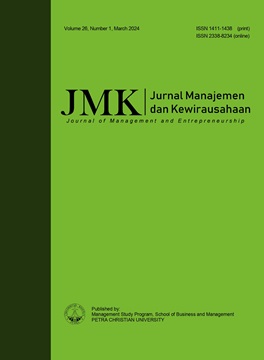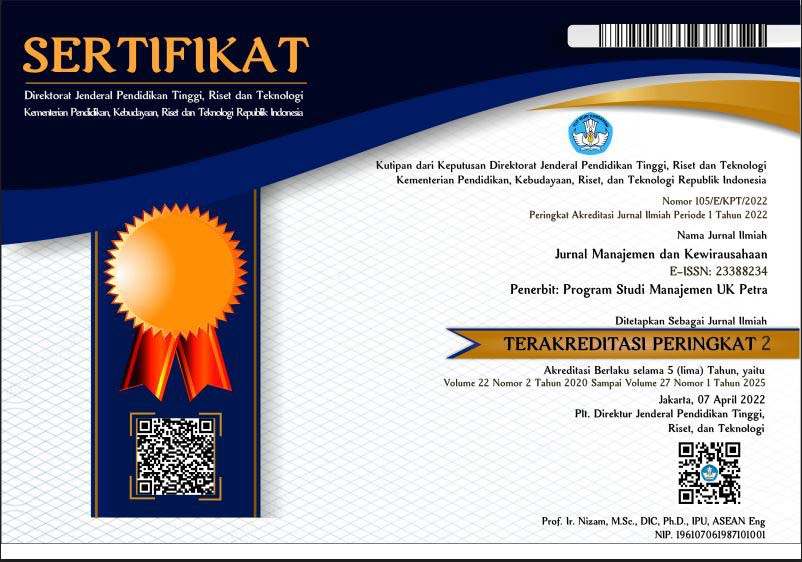HARMONIOUS SOCIAL ENTREPRENEURSHIP: A BUSINESS INNOVATION MODEL FOR EMPOWERING INDONESIAN COMMUNITIES THROUGH RELIGIOUS ORGANIZATIONS
 :
:
https://doi.org/10.9744/jmk.26.1.26-33
Keywords:
Social entrepreneurship, business innovation, religious organizations, community empowermentAbstract
Religious organizations possessed significant potential for community empowerment through social entrepreneurship practices. Although social entrepreneurship had emerged as a strategy within religious institutions to bolster congregational and community economies, it had yet to garner adequate attention. This study aimed to identify social entrepreneurship implementations, explore challenges, and formulate a suitable social entrepreneurship model within the context of religious organizations. The research was conducted within a religious organization in North Sulawesi, Indonesia. The findings suggested that achieving harmonious social entrepreneurship in Indonesia required an inclusive, collaborative stakeholder approach and increased NGO involvement through mentoring roles in entrepreneurial activities. Through a business innovation model integrated into religious organizations, community well-being could be achieved by synergizing entrepreneurship and spiritual values.
References
Bansal, S., Garg, I., & Sharma, G. D. (2019). Social entrepreneurship as a path for social change and driver of sustainable development: A systematic review and research agenda. Sustainability, 11(4), 1091. https://doi.org/10.3390/su11041091 Ćwiklicki, M. (2019). Requirements for scaling inter- national social enterprises. Entrepreneurial Business and Economics Review, 7(1), 45–60. https://doi.org/10.15678/EBER.2019.070103
Dmytriyev, S. D., Freeman, R. E., & Hörisch, J. (2021). The relationship between stakeholder theory and corporate social responsibility: Differences, similarities, and implications for social issues in management. Journal of Management Studies, 58(6), 1441–1470. https://doi.org/10.1111/joms.12684
Edwige, K. (2021). Promoting the growth of micro, small, and medium-sized enterprises using alter- native financing model: Evidence from the Kimbanguist church. Issues in Business Management and Economics, 9(2), 20–25. https://doi.org/10.15739/IBME.21.003
Farmaki, A., Altinay, L., Christou, P., & Kenebayeva, A. (2020). Religion and entrepreneurship in hospitality and tourism. International Journal of Contemporary Hospitality Management, 32(1), 148–172. https://doi.org/10.1108/IJCHM-02-2019-
Hadi, M. I., & Rudiarto, I. (2018). The role of social entrepreneurship on kampong development in the city of Semarang. The Indonesian Journal of Planning and Development, 3 (2), 76–83. https://doi.org/10.14710/ijpd.3.2.76-83
Hossain, M., & Shamsuddoha, M. (2021). Social entrepreneurship: A new genre of entrepreneurship. Business Perspective Review, 2 (3), 60–68. https://doi.org/10.38157/business-perspective-review.v2i3.58
Hu, X., Marlow, S., Zimmermann, A., Martin, L., & Frank, R. (2020). Understanding opportunities in social entrepreneurship: A critical realist abstraction. Entrepreneurship: Theory and Prac- tice, 44(5), 1032–1056. https://doi.org/10.1177/1042258719879633
Kamran, S. M., Khaskhely, M. K., Nassani, A. A., Haf- far, M., & Abro, M. M. Q. (2022). Social entre- preneurship opportunities via distant socializa- tion and social value creation. Sustainability, 14(6), 3170. https://doi.org/10.3390/su14063170
McElroy, B., & Mills, C. (2007). Managing stakeholders. In J. R. Turner (Ed.), Gower Handbook of project management, (pp. 757–775). Hamp- shire: Gower Publishing Limited.
Monteiro, A. A., Sánchez-García, J. C., Hernández- Sánchez, B. R., & Cardella, G. M. (2022). Social entrepreneurship conceptual approaches. Encyclopedia, 2(2), 1004–1018. https://doi.org/10.3390/encyclopedia 2020066
Mthembu, A., & Barnard, B. (2019). Social entrepreneurship: Objectives, innovation, implementation and impact on entrepreneurship. SSRN Electronic Journal, 7(1), 147–177. https://doi.org/10.2139/ssrn.3343448
Murzyn, D. (2021). Social entrepreneurship and se- lected elements of the entrepreneurship ecosystem. Przedsiębiorczość - Edukacja, 17(1), 165–176. https://doi.org/10.24917/20 833296.171.13
Onyemaechi, N. P., Elesho M. T., Charity, I. O., Agboeze, M. U., Justina, I. N., Chinagorom, E. G., Chinyere, O., & Chimezie, N. B. (2021). Influence of social entrepreneurs on community development in Enugu West Senatorial District of Enugustate, Nigeria. World Journal of Advanced Research and Reviews, 11(1), 001–007. https://doi.org/10.30574/wjarr.2021.11.1.0304
Prasetyo, P. E., & Kistanti, N. R. (2020). Role of social entrepreneurship in supporting business opportunities and entrepreneurship competitive- ness. Open Journal of Business and Management, 08(04), 1412–1425. https://doi.org/10.4236/ ojbm.2020.84090
Quagrainie, F. A., Opoku M, A., & Adom, A. Y. (2018). Christian entrepreneurial activities and micro women entrepreneurship development: Church embeddedness in action. Journal of Enterprising Communities: People and Places in the Global Economy, 12 (5), 657–676. https://doi.org/10.1108/JEC-03-2018-0025
Ramoglou, S., Zyglidopoulos, S., & Papadopoulou, F. (2023). Is there an opportunity without stake- holders? A stakeholder theory critique and development of opportunity-actualization. Entrepreneurship: Theory and Practice, 47(1), 113–141. https://doi.org/10.1177/10422587211043354
Sabbaghi, O., & Gerald, G. F. (2018). Social entrepre- neurship and sense-making: Evidence from the Global Social Benefit Institute. Social Enterprise Journal, 14(3), 289–311. https://doi.org/10.1108/SEJ-01-2018-0009
Saebi, T., Foss, N. J., & Linder, S. (2019). Social entrepreneurship research: Past achievements and future promises. Journal of Management, 45(1), 70–95. https://doi.org/10.1177/0149206318793196
Safei, A. A. (2021). The formula of Islamic community development in Indonesia through the social entrepreneurship approach. Religious: Jurnal Studi Agama-Agama dan Lintas Budaya, 5(1), 47–58. https://doi.org/10.15575/rjsalb.v5i1.9685
Saragih, E. S. (2019). Fungsi gereja sebagai entrepreneurship sosial dalam masyarakat majemuk. Kurios: Jurnal Teologi dan Pendidikan Agama Kristen, 5(1), 12–23. https://doi.org/10.30995/kur.v5i1.89
Shepherd, D. A., Wennberg, K., Suddaby, R., & Wiklund, J. (2019). What are we explaining? A review and agenda on initiating, engaging, performing, and contextualizing entrepreneurship. Journal of Management, 45(1), 159–196.
https://doi.org/10.1177/014920631879 9443
Sirine, H., Andadari, R. K., & Suharti, L. (2020). Social entrepreneurship model: The impact of im- plementing corporate social responsibility (Case study of Sido Muncul Partnership Pro- gram). International Journal of Business Studies, 4(3), 171–183.
Sirine, H., & Dewi, Y. E. P. (2022). Business model canvas: The implementation method of corporate social entrepreneurship. JAGADITHA: Jurnal Ekonomi & Bisnis, 9(2), 176–184. https://doi.org/10.22225/jj.9.2.2022.17 6-184
Suwarto, A. (2022). Synergy between the church and government in community development: A socio-cultural entrepreneurship approach. In D. Turcanu-Carutiu (Ed.), Heritage -new paradigm (pp. 1-16). IntechOpen. DOI: 10.5772/intechopen. 105612
Zhang, X., Sun, Y., Gao, Y., & Dong, Y. (2022). Paths out of poverty: Social entrepreneurship and sustainable development. Frontiers in Psychology, 13(1), 1–13. https://doi.org/10.3389/fpsyg.2022.106269
Downloads
Published
How to Cite
Issue
Section
License
Copyright (c) 2024 Waraney Alfonsus Matthew Punuh, Hani Sirine

This work is licensed under a Creative Commons Attribution 4.0 International License.
Authors who publish on this journal agree to the following terms:
- Authors retain copyright and grant the journal right of first publication with the work simultaneously licensed under a Creative Commons Attribution License that allows others to share the work with an acknowledgement of the work's authorship and initial publication in this journal.
- Authors are able to enter into separate, additional contractual arrangements for the non-exclusive distribution of the journal's published version of the work (e.g., post it to an institutional repository or publish it in a book), with an acknowledgement of its initial publication in this journal.
- Authors are permitted and encouraged to post their work online (e.g., in institutional repositories or on their website) prior to and during the submission process, as it can lead to productive exchanges, as well as earlier and greater citation of published work (See The Effect of Open Access).


















